Your search “Keep%20ethe%20eDeacth%20ePenalty%abolished%20ein%20ethe%20ePhilippfines%20e%20e%20e%20e%20e%20e%20e%20e%20e%20e/page/www.humanrights.asia/resources/report/20e11/AHRC-sur-008-20e11/act_download/file ”
Article(s)
Capital punishment now part of Togo’s history
on 24 June 2009
Togo’s National Assembly passed a bill abolishing the death penalty on June 23, 2009. Spanish Prime Minister José Luis Zapatero, who was visiting the country, attended the parliamentary session to witness the event.
2009
Togo
Togo
Article(s)
Campaigners and political leaders unite against the death penalty
on 24 February 2010
Representatives from 56 abolitionist and retentionist countries attended the opening session of the World Congress Against the Death Penalty in Geneva.
2010
Belarus
France
Italy
Mongolia
Norway
Qatar
Senegal
Spain
Switzerland
Viet Nam
Page(s)
Become a member
on 22 June 2020
Only legal entities can join the World Coalition Against the Death Penalty In accordance with article 5.1. of its Bylaws, the World Coalition welcomes organizations that share the aim of the universal abolition of the death penalty. What the World Coalition offers its members What the World Coalition does not offer its members How members […]
2020

Article(s)
Morocco’s death penalty takes centre stage at Marrakesh forum
By Thomas Hubert (in Marrakesh, Morocco), on 28 November 2014
Debates on the abolition of the death penalty at the World Human Rights Forum have highlighted the situation in the host country among the major fronts in the abolitionist struggle.
2014
Morocco

Article(s)
Progress and impediments on path to abolition in U.S.
By Russ Feingold & Christopher Wright Durocher, on 3 April 2024
When President Biden won the 2020 election, he became the first successful U.S. presidential candidate to publicly oppose the death penalty.
2024
United States
Article(s)
Mexican executed in Texas
on 5 August 2008
Jose Medellin, a Mexican sentenced to death in Texas, was executed on August 5 despite serious flaws in his trial. The Texas Coalition to Abolish the Death Penalty denounces an “irrevocable breach of international law”.
2008
Legal Representation
Mexico
United States
Article(s)
Global mobilisation against Iraq’s high-profile death sentences
on 4 December 2010
Several former associates of Saddam Hussein have been sentenced to death. The Iraqi President, NGOs and international diplomats are now fighting to save their lives.
2010
Clemency
Iraq
Iraq
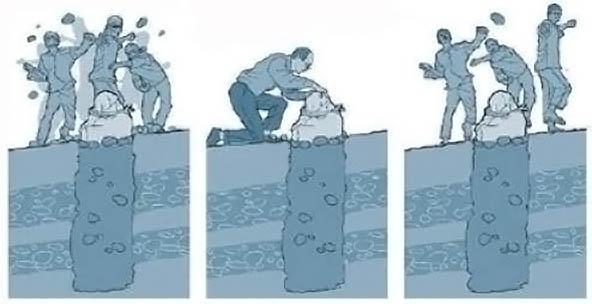
Article(s)
World Coalition members share knowledge on UN advocacy
By Asil Abuassba (The Advocates for Human Rights), on 19 February 2015
Asil Abuassba, a Palestinian intern with World Coalition member organisation The Advocates for Human Rights, attended a training session to help global activists submit reports on the death penalty situation in their countries to UN bodies.
2015
Cruel, Inhuman and Degrading Treatment and Punishment
Death Row Conditions
Fair Trial
Innocence
Intellectual Disability
Juveniles
Mental Illness
Article(s)
Video: meet Taiwan’s anti-death penalty activists
on 16 June 2009
The Taiwan Alliance to End the Death Penalty has just released a clip presenting its work and the status of capital punishment in the country.
2009
Taiwan
Article(s)
10.10.10 World Day Against the Death Penalty – USA special
on 6 August 2010
On 10 October 2010, the World Day Against the Death Penalty will focus on the USA. There are two months left to prepare and promote the events planned around the world on the big day.
2010
Cruel, Inhuman and Degrading Treatment and Punishment
United States
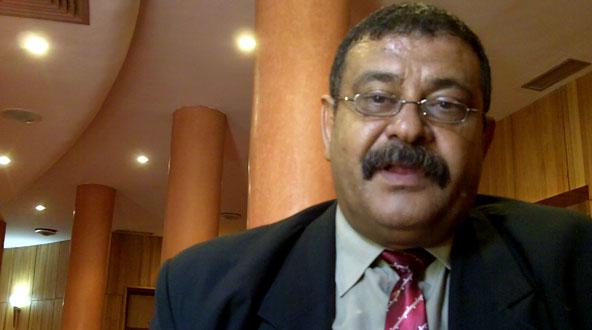
Article(s)
More than 1,000 sentenced to death in Iraq in 8 years
By Dr Nasr Abbood, on 1 March 2012
The Iraqi institutions established after the US-led invasion and the fall of Saddam Hussein have reinstated the death penalty and extended its scope since 2004. In this op-ed article, Iraqi Coalition Against the Death Penalty president Nassr Abood calls for alternative sentences and for a strong stance from the international community.
2012
Drug Offenses
Iraq
Iraq
Terrorism
Article(s)
Benin on track to achieve abolition
on 7 February 2010
Benin’s President Thomas Yayi Boni, one of the World Congress’s guests, has asked the parliament to enshrine the abolition of the death penalty in the constitution. Justice Minister Victor Tokpanou details Benin’s path to abolition.
2010
Benin
Benin
Public Opinion
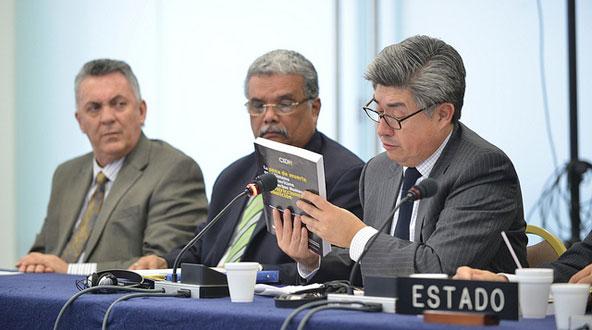
Article(s)
Organisation of American States considers moratorium
By Tiziana Trotta, on 15 March 2013
The Inter-American Commission on Human Rights warns that litigation is insufficient to combat the death penalty.
2013
Argentina
Brazil
Costa Rica
Cuba
Dominican Republic
Ecuador
Guatemala
Mexico
Moratorium
Panama
Suriname
Trinidad and Tobago
United States
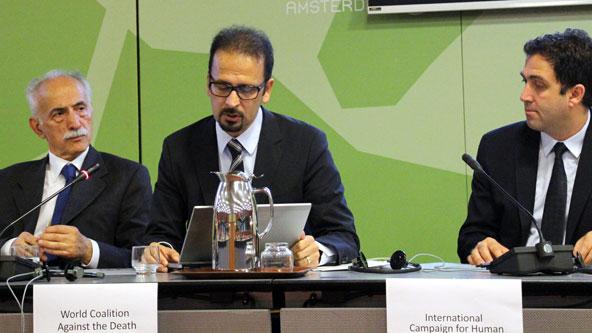
Article(s)
NGOs join forces to tackle capital punishment at Iran’s rights review
By Thomas Hubert, on 30 October 2014
Several World Coalition members are among organisations co-ordinating their efforts to help the international community put pressure on Iran over its use of the death penalty.
2014
Iran (Islamic Republic of)
Article(s)
Moving towards abolition in the Arab World
on 8 October 2010
NGOs and international organisations opposing the death penalty in Arab countries have met in Egypt for the second time. The World Coalition presented them with a new version of its study on abolition in the region.
2010
Djibouti
Egypt
Public Opinion
Turkey
Yemen
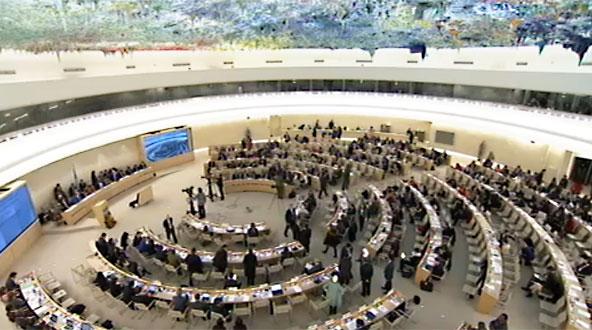
Article(s)
Death penalty: UN General Assembly human rights committee renews call for a moratorium on executions
By Amnesty International, on 23 November 2016
Today the overwhelming majority of UN member states once again threw their weight behind a UN General Assembly draft resolution to establish a moratorium on executions with a view to abolishing the death penalty. 115 of the UN’s 193 member states voted in favour of the proposal, with only 38 voting against it. The draft will now go before the UN General Assembly plenary for final adoption.
2016
Moratorium

Article(s)
New Hampshire: 21st State to Abolish the Death Penalty in the USA
By Aurelie Placais, on 12 June 2019
On 30 May 2019, the NH state Senate voted to override the governor’s veto. The death penalty repeal took effect immediately.
2019
United States
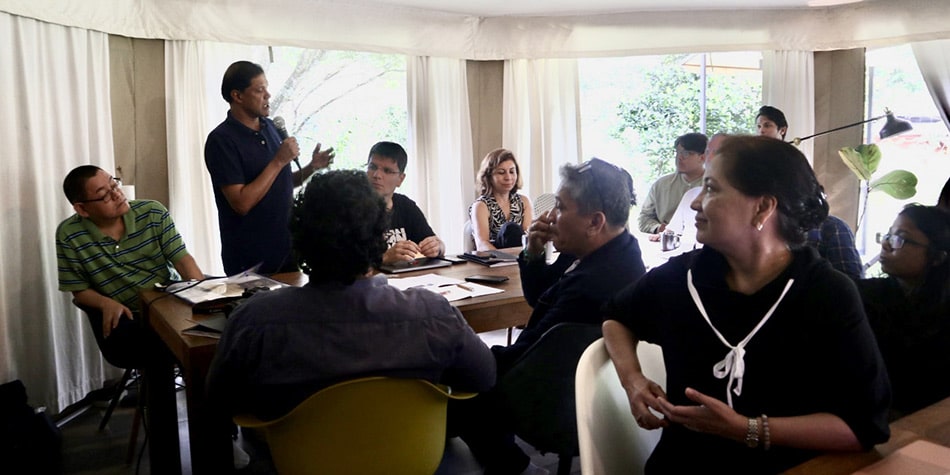
Article(s)
Debunking narratives for a return of the death penalty
By Venus Aves, on 13 November 2023
Time and time again, abolitionists have been making the case against the death penalty, highlighting how inhumane, inefficient and unfair it is.
2023
Drug Offenses
Maldives
Philippines
Public Opinion
Sri Lanka
Trend Towards Abolition
Turkey
Article(s)
Second Optional Protocol: An irreversible mechanism for abolishing the death penalty” – Denys Robiliard
on 7 September 2020
Denys Robiliard, a lawyer and former president of Amnesty International’s French section, details why the Second Optional protocol to the UN’s ICCPR is an crucial instrument to push the abolition of the death penalty worldwide.
2020
Afghanistan
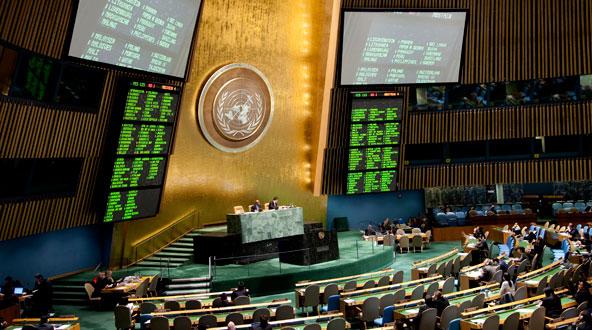
Article(s)
Death penalty: Global abolition closer than ever as record number of countries vote to end executions
By Amnesty International, on 17 December 2018
A record number of States – 121 out of 193 member states – voted in favour of a moratorium on the death penalty at the United Nations General Assembly on December the 17th. A world without the death penalty may become a reality according to Chiara Sangiorgio, Amnesty International’s Death Penalty Expert.
2018
Moratorium
Ending the Death Penalty in Africa
on 10 June 2022
The African continent is part of the international movement towards universal abolition. In 1990, only one country, Cap Verde, had abolished the death penalty. Today, out of the 55 African Union member States, 26 have abolished the death penalty in law, 15 are applying a long-term moratorium on executions while 15 retain capital punishment. Chad […]
2022
Angola
Benin
Botswana
Burkina Faso
Burundi
Cameroon
Cape Verde
Central African Republic
Chad
Comoros
Congo
Côte d'Ivoire
Democratic Republic of the Congo
Djibouti
Equatorial Guinea
Eritrea
Ethiopia
Gabon
Gambia
Ghana
Guinea
Guinea-Bissau
Kenya
Lesotho
Liberia
Madagascar
Mali
Mauritania
Mauritius
Mozambique
Namibia
Niger
Nigeria
Rwanda
Sao Tome and Principe
Senegal
Seychelles
Sierra Leone
Somalia
South Africa
South Sudan
Sudan
Togo
Uganda
Zambia
Zimbabwe
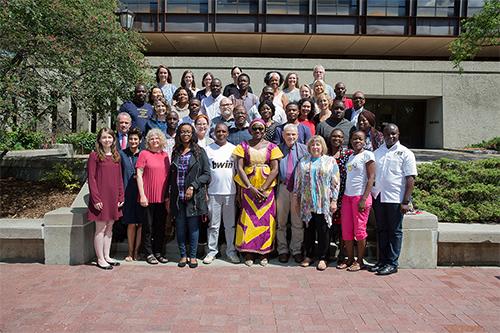
Article(s)
Makwanyane Institute Is Launched at Cornell Law School
By Sherrie Negrea, Cornell Law School, on 17 July 2017
Fifteen capital defense lawyers from eight African countries arrived at Cornell Law School on June 12 to begin eight days of training on how best to represent death penalty clients in the first session of the Makwanyane Institute.
2017
Legal Representation

Article(s)
Suriname and Haiti to lead abolitionist way in the Caribbean
By Thomas Hubert (in San Juan, Puerto Rico), on 27 June 2014
The World Coalition held its 2014 AGM in abolitionist Puerto Rico and highlighted key regional developments in the fight against the death penalty, which remains on the books of many countries in the Greater Caribbean.
2014
Barbados
Haiti
Jamaica
Puerto Rico
Suriname
Suriname
Trinidad and Tobago
Article(s)
Petition against the Death Penalty
By World Coalition Against the Death Penalty, on 1 October 2011
139 nations have already abolished the death penalty. In December 2012, the United Nations’ General Assembly will vote on a resolution calling for a worldwide halt to its use. We, the undersigned, in recognition of the five million people who signed the moratorium petition that was handed to the United Nations’ General Assembly in […]
2011

18th World Day Against the Death Penalty: Access to Counsel – A Matter of Life or Death
on 18 September 2020
Without access to effective legal representation during arrest, detention, trial and post-trial, due process cannot be guaranteed. In a capital case, the consequences that can arise from a lack of effective legal representation can be nothing less than the difference between life and death. On the national and international levels, the right to legal representation […]
2020
Public Opinion
Document(s)
Law, society, and capital punishment in Asia
By David T. Johnson / Franklin E. Zimring / Punishment and Society, on 1 January 2008
2008
Article
Japan
More details See the document
Students of capital punishment need to study Asia, the site of at least 85 percent and as many as 95 percent of the world’s executions. This article explores the varieties of Asian capital punishment in two complementary ways. Cross-sectionally, the impression of uniformity that comes from classifying 95 percent of the population of Asia as living in executing states breaks down when closer attention is paid to the character of capital punishment policy within retentionist nations. Temporally, the general trajectory of capital punishment in the Asian region seems downward (though generalizations about patterns in this part of the world are undermined by significant data problems). Asia is also a useful territory for testing the generality of theories of capital punishment based on European experience. Looking forward, Japan and South Korea, two developed nations in Asia that still retain the death penalty, may indicate what other Asian nations are likely to do as they develop. Ultimately, Asia either will become a major staging area for world-wide abolition or the campaign against capital punishment will fail to achieve global status.
- Document type Article
- Countries list Japan
Article(s)
End the death penalty for drug-related offences
on 26 June 2009
June 26 is a world day of action against drugs. Several international NGOs have joined their voices to condemn the use of capital punishment against drug users and traffickers.
2009
China
Drug Offenses
Indonesia
Viet Nam
Article(s)
Abolitionist co-operation at all levels kick-started in Geneva
on 24 February 2010
The first plenary session of the World Congress Against the Death Penalty focused on “increasing cooperation between States, NGOs and international organizations and developing common strategies for a death penalty-free world”.
2010
China
Iran (Islamic Republic of)
Moratorium
Switzerland
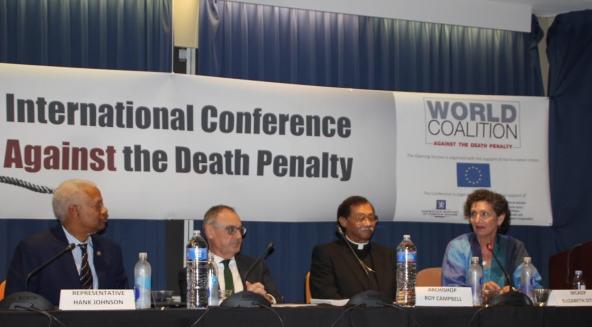
Article(s)
International Conference Against the Death Penalty: abolistionists are united and determined
By Lorène du Crest, on 18 July 2017
The World Coalition Against the Death Penalty celebrated its 15th anniversary with an International Conference and its General Assembly on 22-24 June in Washington DC.
2017
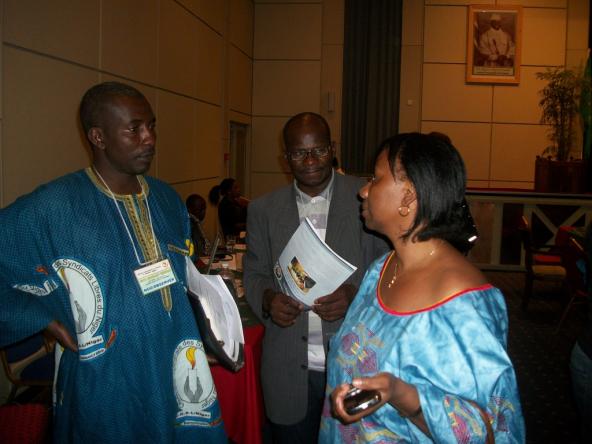
Article(s)
African human rights body targets death penalty
on 16 May 2011
The abolition of the capital punishment figured prominently at the 49th session of the African Commission of Human and People’s Rights.
2011
Algeria
Botswana
Democratic Republic of the Congo
Equatorial Guinea
Mauritania
Public Opinion
Somalia
Sudan
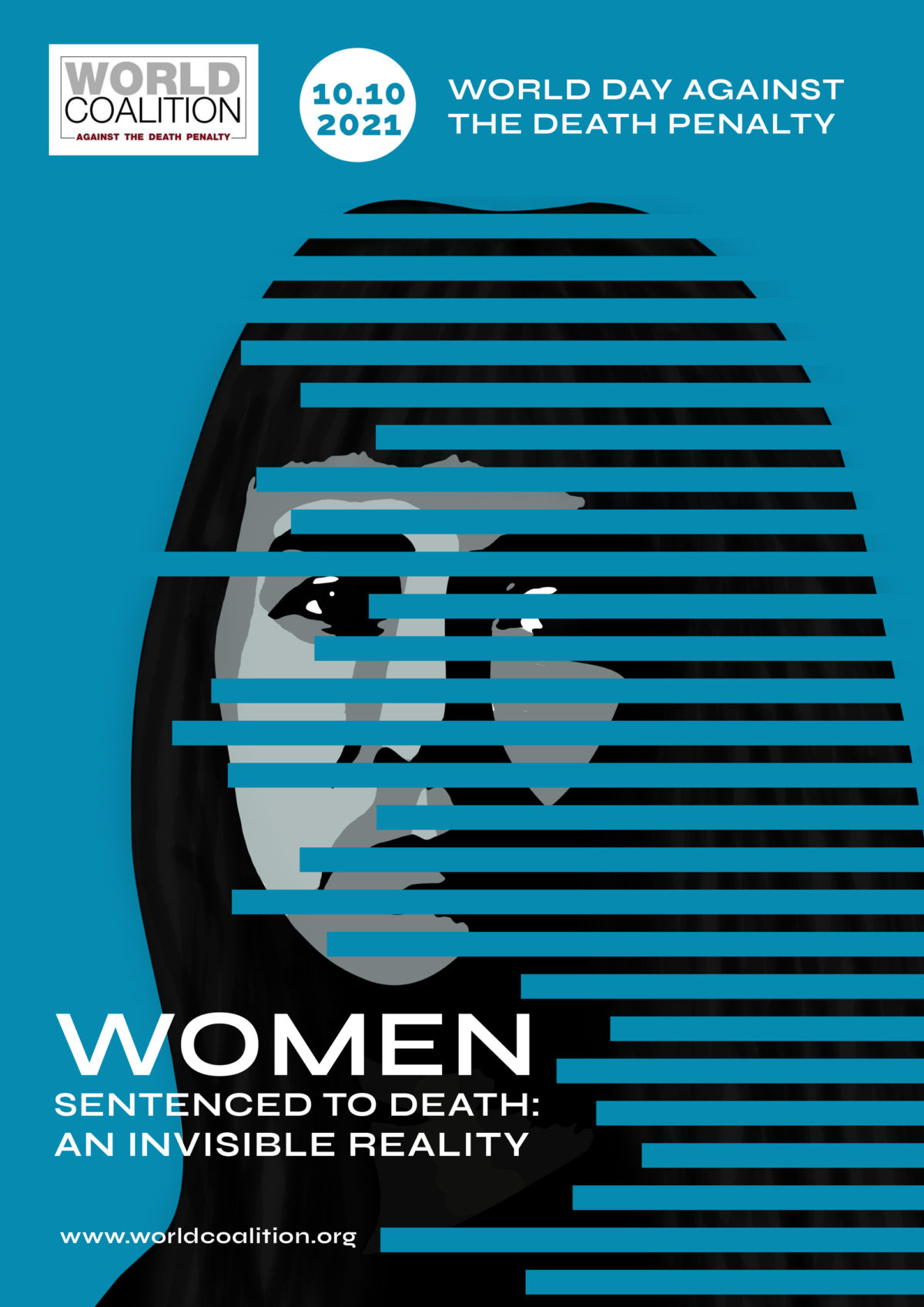
19th World Day Against the Death Penalty – Women and the death penalty, an invisible reality
on 10 June 2021
On 10 October 2021, the World Day will be dedicated to women who risk being sentenced to death, who have received a death sentence, who have been executed, and to those who have had their death sentences commuted, exonerated, or pardoned.
2021
Women

Article(s)
Sharing best practices on ratifying the UN treaty to abolish the death penalty
By Aurélie Plaçais, on 25 September 2011
Belgium and the United Nations’ human rights office have held a panel discussion to promote efforts in favour of the strongest international instrument against capital punishment.
2011
Belgium
Mongolia
Moratorium
Russian Federation
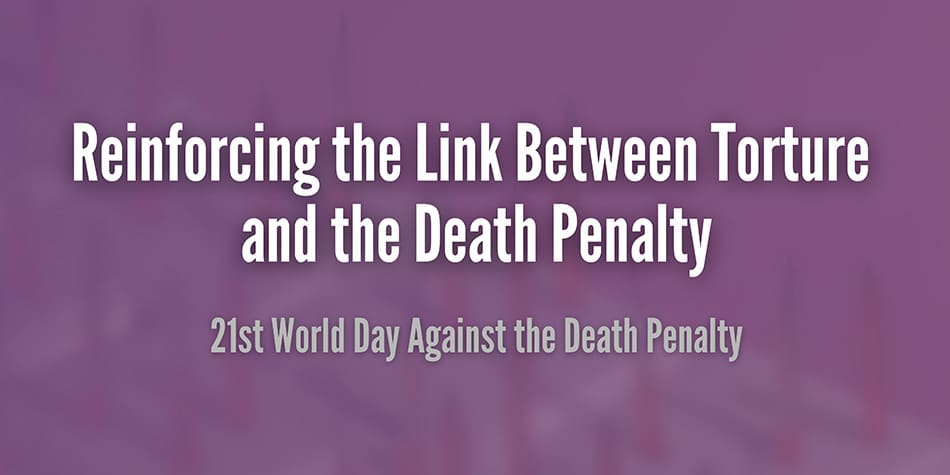
Article(s)
Reinforcing the Link Between Torture and the Death Penalty: 21st World Day Against the Death Penalty
By Venus Aves, on 17 November 2023
“There is no way in today’s world to apply the death penalty in a legal way, in a way that does not violate international law.” This was the bold and unequivocal assertion of former UN Special Rapporteur on Torture Juan Méndez in an online discussion with UN experts and exonerees organized by the World Coalition […]
2023
Cruel, Inhuman and Degrading Treatment and Punishment

Article(s)
Mass convictions and executions fuel terrorism in Iraq
By Clémentine Etienne, on 27 June 2018
Mass executions in Iraq since 2017 seem to hide behind the scourge of terrorism, the major argument given by the current government. Will May 2018 elections defeat this government policy and the misuse of the country’s anti-terrorism law to sentence to death?
2018
Iran (Islamic Republic of)
Public Opinion
Article(s)
Saudi Arabia slammed over child executions, discrimination
on 21 February 2009
United Nations agencies, governments and NGOs criticised Saudi Arabia’s death penalty record at the UN’s universal periodic review of human rights.
2009
Juveniles
Saudi Arabia
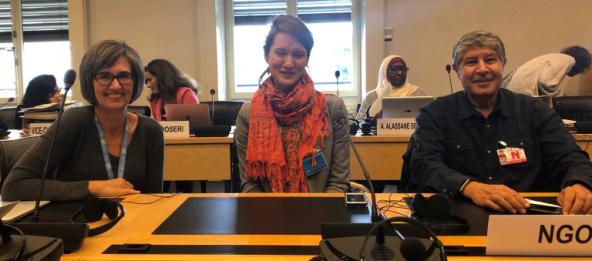
Article(s)
The Rights of Children Whose Parents Are Sentenced to Death – The Case of Tunisia
By Lisa Borden, volunteer with The Advocates for Human Rights, on 30 October 2019
I joined Bronwyn Dudley of the World Coalition Against the Death Penalty, and Choukri Latif of the Coalition tunissiene contre la peine de mort (a Tunisian anti-death penalty NGO), to address the committee regarding Tunisia’s failure to implement the rights of children whose parents have been sentenced to death or were executed.
2019
Juveniles
Tunisia

Article(s)
The death penalty in the DRC: an illusory means of combating impunity in the face of human rights implementation
By Mr Olivier LUNGWE FATAKI of Pax Christi Uvira, absl, on 30 August 2024
The Democratic Republic of the Congo (DRC) is one of the States which has retained the death penalty in its legal arsenal, although applies a de facto moratorium on executions since 2003.
2024
Democratic Republic of the Congo
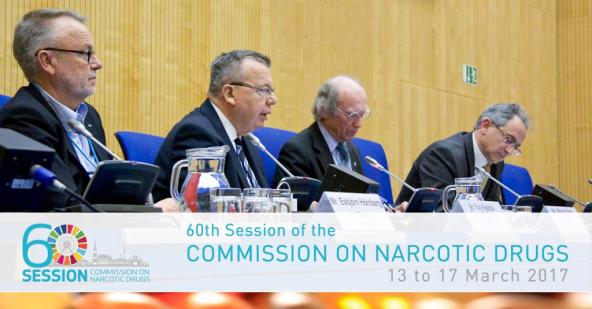
Article(s)
Death penalty and the “war on drugs” discussed during the 60th U.N. Commission on Narcotic Drugs annual meeting.
By Lorène du Crest, on 31 March 2017
In March 2017, the 60th Commission on Narcotic Drugs annual meeting in Vienna took place. During this meeting, governments have been encouraged to “promote proportionate national sentencing policies for drug-related offences”. The death penalty was addressed during several side events.
2017
Drug Offenses
Public Opinion
Article(s)
World Coalition welcomes the success of its 15th General Assembly
By World Coalition Against the Death Penalty, on 8 September 2017
More than 50 member organisations of the World Coalition Against the Death Penalty gathered for three days on 22-24 June 2017 in Washington DC for the General Assembly of the World Coalition.
2017
Article(s)
UN resolution: the abolitionist front grows stronger again
on 22 December 2010
The World Coalition Against the Death Penalty welcomes the adoption by the United Nations General Assembly of a third resolution calling for a universal moratorium on the use of the death penalty.
2010
Moratorium

Article(s)
World Coalition elects new Steering Committee and Executive Board for two years
By World Coalition Against the Death Penalty, on 10 September 2021
The World Coalition Against the Death Penalty held its first 100% virtual General Assembly on 18 June 2021 to elect its new Steering Committee.
2021
Juveniles
Article(s)
Web-Editor
By World Coalition Against the Death Penalty, on 9 October 2018
The World Coalition Against the Death Penalty is recruiting a Web-editor/Editorial Webmaster for its website.
2018
Document(s)
Detailed Factsheet 2010
By World Coalition against the death penalty , on 10 October 2010
2010
Campaigning
Trend Towards Abolition
frMore details Download [ pdf - 479 Ko ]
Detailed Factsheet 2010
- Document type Campaigning
- Themes list Trend Towards Abolition
- Available languages Fiche détaillée 2010

Article(s)
Abolition of the death penalty at the United Nations Human Rights Council 55th session
on 13 September 2024
The United Nations Human Rights Council met for its 55th Regular Session from February 26 to April 5, 2024. If you missed it, here is what happened regarding the abolition of the death penalty!
2024
Trend Towards Abolition
amnesty-report-2021-ES
on 9 June 2022
2022
WD2019_Annual-Report_FR-1.pdf
on 8 September 2020
2020
amnesty-report-2021-FR
on 9 June 2022
2022
amnesty-report-2021-AR
on 9 June 2022
2020 WORLD DAY REPORT NO ANNEX
on 9 June 2021
2021
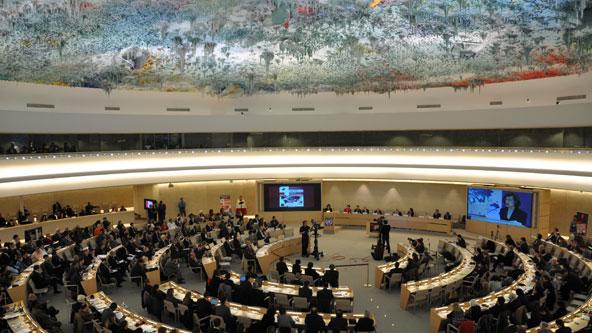
Article(s)
Human Rights Council tackles death penalty
By Aurélie Plaçais, on 29 March 2013
The UN body in charge of defending and promoting human rights has devoted a large part of its 22nd session to discussing capital punishment and its abolition, and vowed to continue at its next meetings.
2013
Algeria
Belgium
Benin
Costa Rica
Egypt
France
Moldova
Mongolia
Rwanda
Switzerland
United States
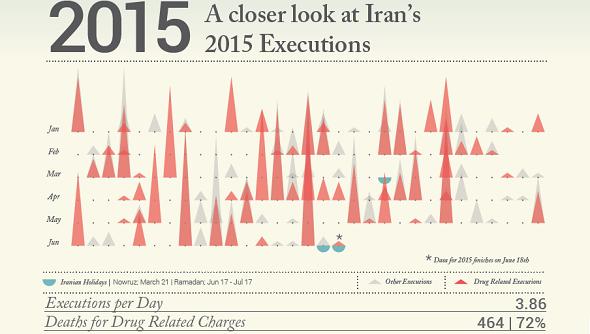
Article(s)
Iran: more than 800 people executed in 2015, 500 for drugs
By Iran Human Rights, on 13 October 2015
Ahead of the 13th World Day Against the Death Penalty, Iran Human Rights is raising awareness about the implementation of the death penalty in Iran for drug-related offenses. Reports from the IHR website indicate that Iranian authorities have carried out more executions in 2015 than any other year in the past 25 years.
2015
Drug Offenses
Iran (Islamic Republic of)
report-death-penalty-iran-2021-FR
on 10 June 2022
2022
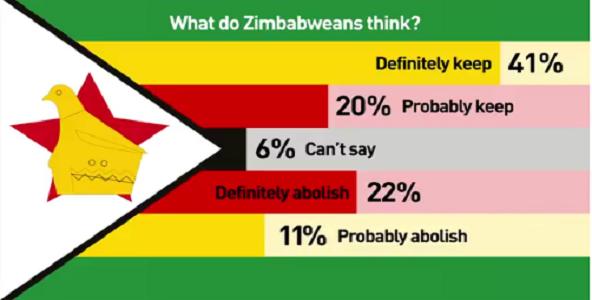
Article(s)
12 Years Without an Execution: Is Zimbabwe Ready for Abolition?
By Death Penalty Project, on 24 May 2018
The Death Penalty Project, in partnership with Veritas, launches “12 Years Without an Execution: Is Zimbabwe Ready for Abolition?” a national public opinion study, providing for the first time comprehensive and contextualised data on public attitudes towards the death penalty in Zimbabwe – a country that has not carried out any executions in over 12 years.
2018
Public Opinion
Zimbabwe
Article(s)
Death penalty and mental illness: “Double Tragedies”
on 7 July 2009
Murder Victims’ Families for Human Rights and the National Alliance on Mental Illness slam the use of capital punishment against mentally ill people in the United States.
2009
Mental Illness
Murder Victims' Families
United States
Article(s)
Trinidad and Tobago narrowly avoids resumption of executions
on 8 March 2011
A bill which aimed to facilitate executions in the Caribbean nation was defeated in Parliament on February 28.
2011
Public Opinion
Trinidad and Tobago
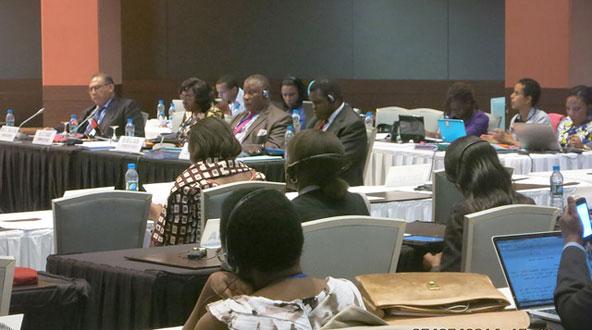
Article(s)
Abolitionists slam Liberia’s death penalty at African human rights review
By Rescue Alternatives Liberia (RAL), on 23 May 2014
World Coalition members RAL, FIACAT and FIDH took part in this month’s 55th Session of the African Commission of Human and People’s Rights in Luanda, Angola, which included the periodic review of the situation in Liberia.
2014
Liberia
Article(s)
Liberia urged not to resume executions
on 9 April 2010
The World Coalition has been active in Liberia and internationally to bring the West African country back into the abolitionist community.
2010
Liberia
Liberia
Document(s)
Capital punishment and implementation of the safeguards guaranteeing protection of the rights of those facing the death penalty: Report of the Secretary-General
By United Nations, on 1 January 2005
2005
International law - United Nations
arruesesarruenfrfrzh-hantzh-hantMore details See the document
The present report, prepared pursuant to Economic and Social Council resolutions 1754 (LIV) of 16 May 1973 and 1995/57 of 28 July 1995, is the seventh quinquennial report of the Secretary-General on capital punishment.1 It covers the period 1999-2003 and reviews developments in the use of capital punishment worldwide, both in law and in practice. The report shows an encouraging trend towards abolition and restriction of the use of capital punishment in most countries. It also shows that much remains to be done in the implementation of the safeguards guaranteeing protection of the rights of persons facing the death penalty in those countries that retain it.
- Document type International law - United Nations
- Themes list Trend Towards Abolition,
- Available languages عقوبة الإعدام وتنفيذ الضمانات التي تكفل حماية حقوق الذين يواجهون عقوبة الإعدام : م ذكّرة من الأمين العامСмертная казнь и применение мер, гарантирующих защиту прав тех, кому грозит смертная казнь : Доклад Генерального секретаряLa pena capital y la aplicación de las salvaguardias para garantizar la protección de los derechos de los condenados a la pena de muerte : Informe del Secretario GeneralLa pena capital y la aplicación de las salvaguardias para garantizar la protección de los derechos de los condenados a la pena de muerte : Informe del Secretario Generalعقوبة الإعدام وتنفيذ الضمانات التي تكفل حقوق ال ذين يواجهون عقوبة الإعدام :تقرير الأمين العامСмертная казнь и осуществление мер, гарантирующих защиту прав тех, кто приговорен к смертной казни: Доклад Генерального секретаряCapital punishment and implementation of the safeguards guaranteeing protection of the rights of those facing the death penalty : report of the Secretary-GeneralPeine capitale et application des garanties pour la protection des droits des personnes passibles de la peine de mort: Rapport du Secrétaire généralPeine capitale et application des garanties pour la protection des droits des personnes passibles de la peine de mort: Rapport du Secrétaire général死刑和保护死刑犯权利的保障措施的执行情况: 秘书长的报告死刑和保护死刑犯权利的保障措施的执行情况: 秘书长的报告
Document(s)
Detailed Factsheet
By World coalition against the death penalty , on 10 October 2011
2011
Campaigning
Trend Towards Abolition
frMore details Download [ pdf - 201 Ko ]
Detailed Factsheet 2019
- Document type Campaigning
- Themes list Trend Towards Abolition
- Available languages Fiche détaillée 2011
Document(s)
Add Resources and Apply Them Systemically: Governments’ Responsibilities Under the Revised ABA Capital Defense Representation Guidelines
By Eric M. Freedman / Hofstra Law Review, on 1 January 2003
2003
Article
United States
More details See the document
The mainstream legal community, including the ABA, has long understood the importance of system-building, but the revised Guidelines state the point especially forcefully. In articulating “the current consensus about what is required to provide effective defense representation in capital cases,” they set high performance standards not just for lawyers, but for death penalty jurisdictions. As the problems are systemic, it is “imperative” that the solutions be.The Guidelines accordingly not only call on governments to deliver capital defense resources that are sufficient in amount, but also furnish the states with a user-friendly blueprint for using those resources wisely to create structures that will function well in the present and evolve effectively over time. This mandate for institution-building is welcome, and the states should lead it. Indeed, they must do so if the Guidelines are to achieve their ameliorative purposes and avoid becoming just a collection of lofty aspirations “‘that palter with us in a double sense, that keep the word of promise to our ear, and break it to our hope”.
- Document type Article
- Countries list United States
- Themes list Legal Representation,
Document(s)
World Coalition Strategic Plan 2023-2027
By World Coalition Against the Death Penalty, on 22 August 2023
2023
World Coalition
Trend Towards Abolition
frMore details Download [ pdf - 455 Ko ]
- Document type World Coalition
- Themes list Trend Towards Abolition
- Available languages Plan Stratégique 2023-2027 de la Coalition Mondiale
Document(s)
Blaming it on the past: Usages of the Middle Ages in contemporary discourses of the death penalty in England
By Death Penalty Research Unit (DPRU), University of Oxford, on 5 February 2024
2024
Academic Article
United Kingdom
More details See the document
Published in December 2023.
In popular, intellectual and political culture, the Middle Ages are intrinsically tied to violent images of public executions. To historians of the medieval period, this temporal attachment of the death penalty to a remote period is puzzling, especially since it is still widely enforced in the world today and was only relatively recently abolished in Europe. Capital punishment is not only a part of history, but a modern-day reality. Why, therefore, do we pin this punishment to the Middle Ages? This paper aims to analyse the discourses surrounding the usage of the Middle Ages in modern discussions on the death penalty, and to clarify medieval practices of capital punishment, showing how remote they are from our contemporary understanding
- Document type Academic Article
- Countries list United Kingdom
Document(s)
Deeply Rooted: How Racial History Informs Oklahoma’s Death Penalty
By Death Penalty Information Center, on 14 October 2022
2022
Article
United States
More details See the document
These individual cases illustrate issues found in systemic reviews of the state’s death penalty system. In 2017, a bipartisan commission that included former prosecutors, defense lawyers, judges, citizens, crime victim advocates, and law professors found that the state’s capital punishment system created “unacceptable risks of inconsistent, discriminatory, and inhumane application of the death penalty.” In an extensively researched report, the commission recommended a moratorium on executions until reforms were made. Five years later, Oklahoma has enacted “virtually none” of the suggested reforms.
- Document type Article
- Countries list United States
Document(s)
ENHANCING EU ACTION ON THE DEATH PENALTY IN ASIA
By Roger Hood / European Parliament / DIRECTORATE-GENERAL FOR EXTERNAL POLICIES OF THE UNION, on 1 January 2012
2012
Article
More details See the document
This paper has three objectives. First, it provides an analysis of the state-of-play regarding the death penalty in Asia. Second it reports on EU human rights dialogues. Third, it suggests policies that might help to support initiatives in Asian countries aimed both at restraining the use of the death penalty and securing its complete abolition.
- Document type Article
- Themes list Trend Towards Abolition, Country/Regional profiles,
Document(s)
The Next Frontier: National Development, Political Change, and the Death Penalty in Asia
By David T. Johnson / Franklin E. Zimring / Oxford University Press, on 1 January 2009
2009
Book
China
More details See the document
Authors David Johnson, an expert on law and society in Asia, and Franklin Zimring, a senior authority on capital punishment, utilize their research to identify the critical factors affecting the future of the death penalty in Asia. They found that when an authoritarian state experienced democratic reform, such as in Taiwan and South Korea, the rate of executions dropped sharply. Johnson and Zimring also found that politics, instead of culture or tradition, is the major obstacle to the end of capital punishment in Asia.
- Document type Book
- Countries list China
Document(s)
The Use of the Death Penalty as a Bargaining Chip in Innocence Cases
By Claudia I. Salinas, California Western International Law Journal, on 1 February 2024
2024
Academic Article
United States
More details See the document
Published in 2023.
While 70% of the world’s countries have abolished the death penalty, also known as capital punishment, much of the United States continues to use it in its criminal legal proceedings.According to the Death Penalty Information Center, at least 190 people were exonerated prior to their fated execution date after being wrongly convicted and sentenced to death in the United States. There is no way to tell how many of the 1,562 people, who have been executed in the United States, were actually innocent. As there are wrongful convictions still happening today, it is no surprise that most countries consider the death penalty a human rights issue.
- Document type Academic Article
- Countries list United States
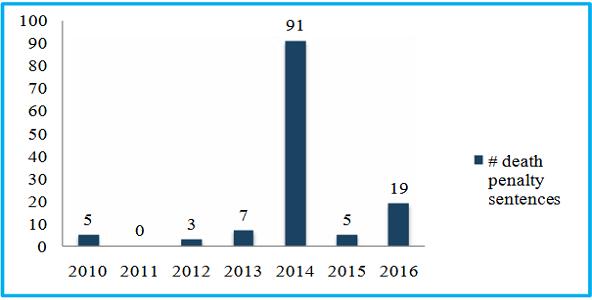
Article(s)
“Unknown Assailants: A Threat to Human Rights”
By Legal Human Rights Centre, on 4 May 2018
So is named The Tanzania Human Rights Report of 2017 released by the Legal and Human Rights Centre (LHRC).This report was published on April 25th, 2018 and it enlights for the fifteenth time the major human rights violations in Tanzania. This report, while it deals with human rights violation in Tanzania concerning civil and politial rights, freedom of violence, freedom of expression, also presents the death penalty as an issue in the coutnry and called the President for its abolition.
2018
Cruel, Inhuman and Degrading Treatment and Punishment
United Republic of Tanzania
Document(s)
File: Saudi Arabia in the World Day against the Death Penalty, execution of Civil Society
By European Saudi Organisation for Human Rights, on 1 January 2018
2018
Multimedia content
Saudi Arabia
More details See the document
Saudi Arabia uses the death penalty as an instrument against individuals, society and freedoms. It is used far away from any international laws and frameworks as it is applied sometimes on children. These practices have become an approach that includes numerous violations as well as denial of the right to life, such as arbitrary detention, torture and unfair trials. As the world revives the anti-death penalty day on October 10, the European Saudi organization for Human Rights (ESOHR) illuminates it through its figures, the issues it has documented and the campaigns it has led. Through the articles published ESOHR tries to show the usage of the death penalty by the Saudi government as a mean to achieve its goals and to impose silence.
- Document type Multimedia content
- Countries list Saudi Arabia
- Themes list Death Penalty, Country/Regional profiles,

Member(s)
Coalition of Somali Human Rights Defenders CSHRD
on 24 July 2024
The Coalition of Somali Human Rights Defenders (CSHRD) is an organization dedicated to promoting and protecting human rights in Somalia. CSHRD was established in 2014. CSHRD runs holistic and comprehensive torture victims rehabilitation centre in Somalia. CSHRD work is guided by the Universal Declaration of Human Rights UDHR and the SDGs of 1, 5, 10, […]
2024
Somalia
Document(s)
The Innocence Protection Act of 2001
By Senator Patrick Leahy / Hofstra Law Review, on 1 January 2001
2001
Article
United States
More details See the document
The goal of our bill is simple, but profoundly important: to reduce the risk of mistaken executions. The Innocence Protection Act proposes basic, common-sense reforms to our criminal justice system that are designed to protect the innocent and to ensure that if the death penalty is imposed, it is the result of informed and reasoned deliberation, not politics, luck, bias, or guesswork. We have listened to a lot of good advice and made some refinements to the bill since the last Congress, but it is still structured around two principal reforms: improving the availability of DNA testing, and ensuring reasonable minimum standards and funding for court-appointed counsel.
- Document type Article
- Countries list United States
- Themes list Innocence,
Member(s)
Legal Awareness Watch (LAW)
on 30 April 2020
Legal Awareness Watch (LAW) is a nonpartisan, non-profitable NGO registered under law since 1999, holding registration number 1388. Since its creation, LAW has been advocating, and raising awareness in Pakistan on human rights of prisoners in 104 Pakistani prisons i.e. the right to vote, right to dignity, right to life etc. Apart from the promotion […]
2020
Pakistan

Member(s)
The American Constitution Society (ACS)
on 5 September 2022
The American Constitution Society (ACS) is a United States-based network of progressive lawyers, law students, judges, policymakers, legislators, and academics dedicated to realizing the promises of the U.S. Constitution by advancing and defending democracy, justice, equality, and liberty; securing a government that serves the public interest; and guarding against the abuse of law and the […]
2022
United States
Document(s)
Facts and Figures 2011
By World Coalition against the death penalty , on 10 October 2011
2011
Campaigning
Trend Towards Abolition
frMore details Download [ pdf - 100 Ko ]
Facts and Figures 2011
- Document type Campaigning
- Themes list Trend Towards Abolition
- Available languages Faits et chiffres 2011
Document(s)
Death Penalty Trends in Asia Have Possible Implications for China
By Dui Hua Human Rights Journal , on 1 January 2011
2011
Article
More details See the document
This article analyses the latest controversy over the use of the death penalty that erupted not in mainland China but across the strait in Taiwan. In January, the defense ministry there was forced to issue a public apology for a wrongful execution in 1997, followed in early March by the execution of five prisoners without notifying their families.
- Document type Article
- Themes list Networks,
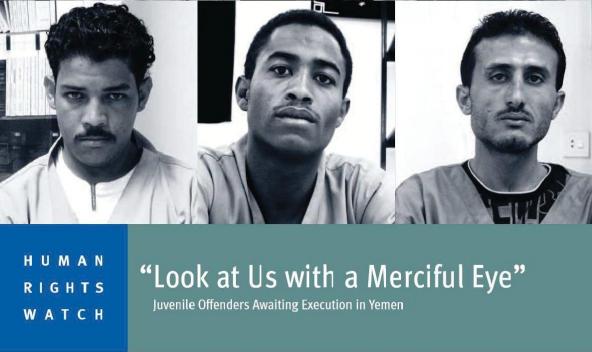
Article(s)
“Look at us with a merciful eye”
By Human Rights Watch, on 5 March 2013
Human Rights Watch is launching a 30-page report on juvenile offenders awaiting execution on Yemen’s death row.
2013
Juveniles
Yemen
Yemen
Document(s)
World Coalition Statutory Auditor’s Report 2022
By World Coalition Against the Death Penalty, on 22 August 2023
2023
World Coalition
Trend Towards Abolition
frMore details Download [ pdf - 4925 Ko ]
- Document type World Coalition
- Themes list Trend Towards Abolition
- Available languages Coalition Mondiale Rapport de la Commissaire aux Comptes 2022
Document(s)
The Death Penalty in Ohio: Fairness, Reliability, and Justice at Risk—A Report on Reforms in Ohio’s Use of the Death Penalty Since the 1997 Ohio State Bar Association Recommendations
By S. Adele Shank / Ohio State Law Journal, on 1 January 2002
2002
Article
United States
More details See the document
The report as presented to the Ohio State Bar Association Council of Delegates in 1997,the OSBA’s recommendations and, where there have been changes in the law since that time, updates reflecting those changes. New information is noted at the conclusion of each section of the report immediately following the OSBA recommendation for that section.
- Document type Article
- Countries list United States
- Themes list Networks,
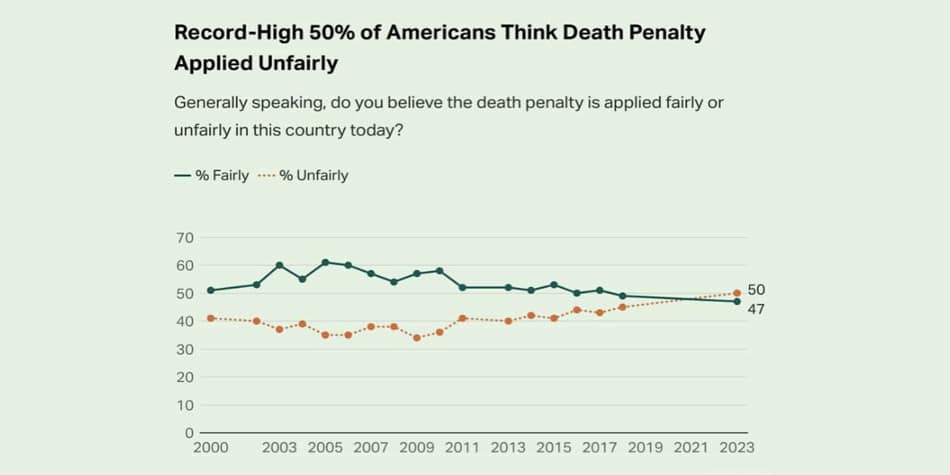
Article(s)
The unprecedent shift in attitudes towards abolition in the US
By World coalition against the death penaly, on 22 March 2024
The Death Penalty Information Center’s 2023 report highlights a rising trend towards abolition in the US, evidenced by a decrease in states conducting executions and heightened backing for individuals asserting innocence. In 2023, the United States witnessed 24 executions, 21 death sentences, and three exonerations, reflecting this evolving trend.
2024
Trend Towards Abolition
United States
Document(s)
Annual Report: Death Penalty in Iran 2012
By Iran Human Rights (IHR), on 1 January 2013
2013
Article
Iran (Islamic Republic of)
fafrenfafrMore details See the document
The report denounces the judicial use of the death penalty in Iran in 2012
- Document type Article
- Countries list Iran (Islamic Republic of)
- Themes list Statistics,
- Available languages گزارش سالانھ مجازات اعدام در ایران سال ۲۱۰۲Rapport Annuel sur la peine de mort en Iran 2012Annual Report: Death Penalty in Iran 2011گزارش سالانه اعدام در ایرا سال ۱۱۲۲Rapport annuel sur la peine de mort en Iran 2011
Document(s)
Summary Report for the United Nations Human Rights Council March 2013
By Abdorrahman Boroumand Foundation for the Promotion of Human Rights and Democracy in Iran, on 1 January 2013
Article
Iran (Islamic Republic of)
More details See the document
The report depicts the prisonners convicted of ordinary crimes’s treatment in Iran
- Document type Article
- Countries list Iran (Islamic Republic of)
- Themes list Cruel, Inhuman and Degrading Treatment and Punishment, Torture,
Document(s)
DPIC Year End Report: Death Sentences, Executions Drop to Historic Lows in 2016
By Death Penalty Information Center, on 1 January 2016
2016
Article
United States
More details See the document
A press release on the DPIC Year End Report 2016: Use of the death penalty fell to historic lows across the United States in 2016. States imposed the fewest death sentences in the modern era of capital punishment, since states began re-enacting death penalty statutes in 1973. New death sentences are predicted to be down 39% from 2015’s 40-year low. Executions declined more than 25% to their lowest level in 25 years, and public opinion polls also measured support for capital punishment at a four-decade low.
- Document type Article
- Countries list United States
- Themes list Trend Towards Abolition, Cruel, Inhuman and Degrading Treatment and Punishment, World Coalition Against the Death Penalty, Death Penalty, Statistics, Country/Regional profiles,
Document(s)
MADP 2015 Annual Report: Infographics
By Missourians for Alternatives to the Death Penalty, on 1 January 2015
2015
Multimedia content
United States
More details See the document
Missouri has had a surge in executions since 2008. The following data shows just how arbitrary and discriminatory Missouri’s death penalty system is. Such disparities in race, geography, and gender, are causes for concern that this system is broken and applied capriciously.
- Document type Multimedia content
- Countries list United States
- Themes list Discrimination, Country/Regional profiles,

Member(s)
Project 39A
on 13 September 2022
Project 39A is a criminal justice initiative, based in the National Law University, Delhi – a prestigious public university in New Delhi. Inspired by Article 39-A of the Indian Constitution, Project 39A’s work furthers the intertwined values of equal justice and equal opportunity. Project 39A uses empirical research to re-examine policies on various criminal justice […]
2022
India

Member(s)
Ensemble contre la peine de mort (ECPM)
on 30 April 2020
Since 2000, Together against the Death Penalty (Ensemble contre la peine de mort – ECPM) acts to fight against the death penalty around the world. The association promotes the universal abolition through the creation and dissemination of publications and teaching tools, as part of public campaigns and lobbies governments at both national and international levels. […]
2020
France
Article(s)
World Coalition calls on Canada to keep up its efforts against the death penalty
on 10 March 2009
The World Coalition has sent a letter to Canadian Prime Minister Stephen Harper, asking him to “protect its nationals sentenced to death abroad, whether it is in a democratic country or not”.
2009
Canada
Canada
Clemency
United States
Document(s)
Executing the Insane Is Against the Law of the Land. So Why Do We Keep Doing It?
By Stephanie Mencimer / Mother Jones, on 1 January 2015
2015
Article
United States
More details See the document
A recent article in Mother Jones examines lingering questions in the determination of which inmates are exempt from execution because of mental incompetency. In 1986, the U.S. Supreme Court ruled in Ford v. Wainwright that a person could not be executed if he or she was “unaware of the punishment they’re about to suffer and why they are to suffer it.” The 2007 ruling in Panetti v. Quarterman updated that decision, with Justice Anthony Kennedy writing, “A prisoner’s awareness of the State’s rationale for an execution is not the same as a rational understanding of it.” Scott Panetti (pictured), the inmate involved in the 2007 case, knew that the state of Texas planned to execute him for the murder of his in-laws, but also sincerely believed that he was at the center of a struggle between God and Satan and was being executed to stop him from preaching the Gospel.
- Document type Article
- Countries list United States
- Themes list Intellectual Disability,
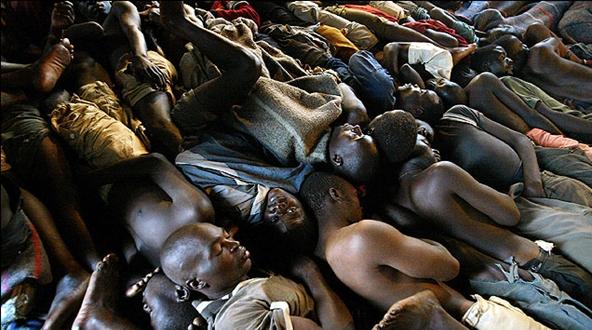
Article(s)
Malawi – five years after abolishing the mandatory death penalty
By Emile Carreau, on 19 September 2012
In 2007 abolitionists celebrated when the High Court of Malawi abolished the mandatory death penalty. In what become known as the Kafanteyeni ruling the mandatory death penalty was deemed by the bench as unconstitutional as it amounts to an arbitrary deprivation of life, denies an accused the right to a fair trial and the right to be free from inhuman and degrading treatment.
2012
Malawi
Article(s)
Arab abolitionists organise to act together
on 8 August 2007
Abolitionists in the Arab World have been generating increased mobilisation and improved co-ordination, with the assistance of Penal Reform International, a member of the World Coalition.
2007
Algeria
Egypt
Jordan
Lebanon
Moratorium
Morocco
State of Palestine
Tunisia
Yemen
Document(s)
The Proposed Innocence Protection Act Won’t—Unless It Also Curbs Mistaken Eyewitness Identifications
By Margery Malkin Koosed / Ohio State Law Journal, on 1 January 2002
2002
Article
United States
More details See the document
This article contends that legislatures should adopt measures to assure greater reliability in the eyewitness testimony introduced in capital cases. Erroneous eyewitness identification is one of the most frequent causes of mistaken convictions and executions. Decades ago, the United States Supreme Court crafted due process and right to counsel constitutional doctrines to curb identification procedures that gratuitously enhanced the risk of mistake. While initial interpretations favored a greater judicial role in preventing such abuses, later rulings retreated. Present constitutional rules do not suffice due to the narrowness of their definition and the weakness of the remedial sanctions allotted. The proposed Innocence Protection Act and similar state legislation trust DNA testing to avert mistaken executions. But testing requires biological material that is often not available in capital prosecutions, and so DNA cannot detect all the innocents among those capitally prosecuted. To avert mistaken convictions and executions, legislative reforms need to go beyond DNA, and avert mistakes arising from erroneous eyewitness identifications. Studies show this is one of the most common sources of unjust conviction, and that suchmistakes may well be on the rise. Federal and state legislation should be adopted that provides a stronger curb on suggestive identification practices that gratuitously increase the risk of executing the innocent. The Recommendations for Lineups and Photospreads, developed by the American Psychology/Law Society (AP/LS) in 1998, are an appropriate starting point for legislatures (or state courts exercising their supervisory powers or interpreting state constitutional provisions). Adopting such guidelines will reduce the risk of error in capital cases, with little or no expense borne by the states. Further, to assure that these more reliable procedures will be used during capital case investigations and prosecutions, legislatures and courts should, minimally, adopt an exclusionary rule of the type first announced by the United States Supreme.
- Document type Article
- Countries list United States
- Themes list Innocence,
Document(s)
Children who are Impacted by a Family Member’s Death Sentence or Execution: Information for Mental Health Professionals
By National Child Traumatic Stress Network (NCTSN), Texas after violence project, Clinical and Support Options, on 11 December 2021
2021
Working with...
Juveniles
More details See the document
This tip sheet provides some guidelines for mental health professionals who may encounter or work with children and families related to individuals who have been sentenced to death or executed.
- Document type Working with...
- Themes list Juveniles

Member(s)
Coalizione italiana contro la pena di morte
on 30 April 2020
The Italian Coalition to Abolish the Death Penalty (ICADP) was established to form a network between both Italian and foreign groups, associations, movements, and individuals that oppose capital punishment, and to coordinate their work and efforts. The ICADP holds talks about the death penalty around the world, spreads information and promotes campaigns. It is especially […]
2020
Italy

Member(s)
Association Justice et Miséricorde (AJEM)
on 30 April 2020
The Association Justice and Mercy (AJEM) is a Lebanese nonprofit, nonpolitical and nonsectarian nongovernmental organization (NGO) created in 1996 at the initiative of a group of social workers. AJEM deals mainly with the right of prisoners in Lebanon, and more generally with human rights, the fight against torture and other cruel, inhuman and degrading treatment, […]
Lebanon

Article(s)
Congo’s Presidential Election Strengthens the Controversial New Constitution that Abolished Capital Punishment
By Delphine Lourtau and Marion Gauer, on 20 April 2016
On March 20, 2016, a tense presidential election in the Republic of the Congo resulted in the re-election of President Denis Sassou Nguesso, who has been in power for a total of 32 years. One of the election’s least discussed outcomes is its solidification of the new constitution that President Sassou introduced last year and that provides for abolition of the death penalty.
2016
Congo
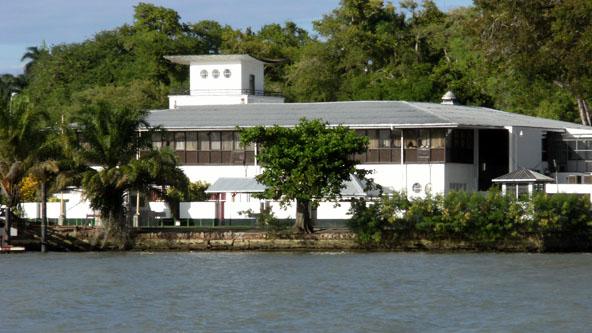
Article(s)
Capital punishment abolished in Suriname
By Parliamentarians for Global Action, on 6 March 2015
The Parliament of Suriname (photo) has abolished the death penalty in law, setting an example for the Greater Caribbean – a major front line in the global fight against capital punishment. World Coalition member organisation Parliamentarians for Global Action provided crucial support for abolition in Suriname.
2015
Suriname
Suriname
Article(s)
Africa takes a good look at the death penalty
on 5 August 2008
A working group of the African Commission on Human and People’s Rights is preparing a report on capital punishment on the continent.
2008
Eswatini
Moratorium
Document(s)
Leaflet – World Day 2024 & 2025
By World coalition against the death penalty, on 10 June 2024
2024
Campaigning
World Coalition
arfrMore details Download [ pdf - 1325 Ko ]
Every 10th October, the World Coalition Against the Death Penalty and abolitionist actors worldwide celebrate the World Day Against the Death Penalty. It is an occasion to highlight the progress achieved in the global campaign for the abolition of capital punishment. In 2024 and 2025, the World Day will serve as an opportunity to challenge […]
- Document type Campaigning / World Coalition
- Available languages كتيب - اليوم العالمي 2024 و 2025Brochure - Journée mondiale 2024 & 2025
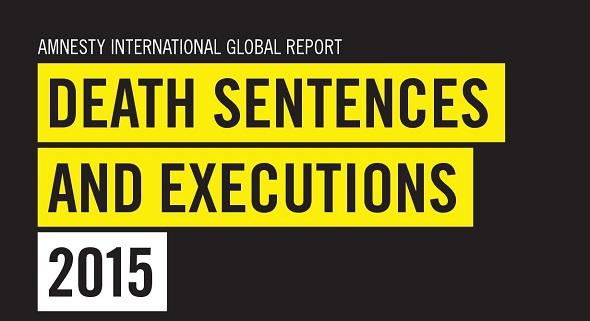
Article(s)
Death sentences and executions in 2015
By Amnesty International, on 10 April 2016
This report covers the judicial use of the death penalty for the period January to December 2015. As in previous years, information is collected from a variety of sources, including: official figures; information from individuals sentenced to death and their families and representatives; reporting by other civil society organizations; and media reports. Amnesty International reports only on executions, death sentences and other aspects of the use of the death penalty, such as commutations and exonerations, where there is reasonable confirmation.
2016
Document(s)
Impact of the World Coalition’s Strategic Plan 2018–2022
By World Coalition Agianst the Death Penalty, on 22 August 2023
2023
World Coalition
Trend Towards Abolition
frMore details Download [ pdf - 265 Ko ]
- Document type World Coalition
- Themes list Trend Towards Abolition
- Available languages Impact du Plan stratégique 2018-2022 de la Coalition Mondiale
PHIL_2_page_handout_EN
on 10 August 2021
2021
Article(s)
Activists oppose the death penalty across Asia
on 30 October 2008
Although European activists were slow to take action on World Day Against the Death Penalty, their Asian counterparts showed their strength, especially in the World Coalition’s target countries.
2008
India
Japan
Mongolia
Pakistan
Public Opinion
Republic of Korea
Taiwan

